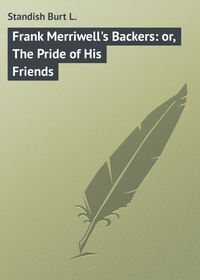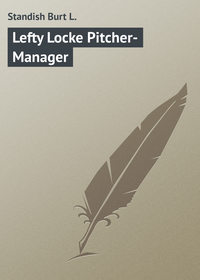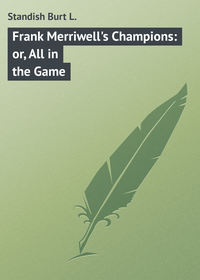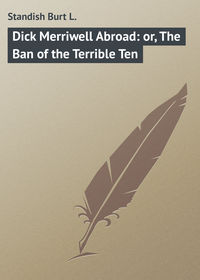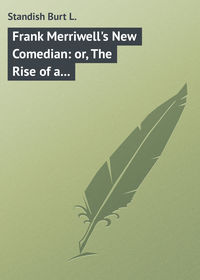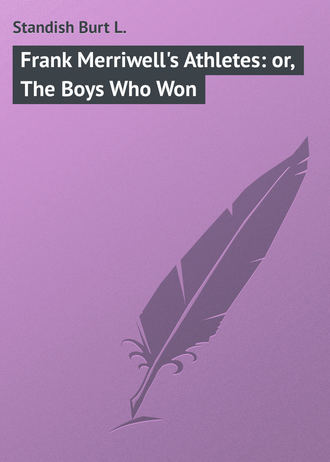 полная версия
полная версияFrank Merriwell's Athletes: or, The Boys Who Won
The first turn of the road around a jutting rock hid the railroad from view, and it seemed that the party immediately plunged one hundred years into antiquity.
Each seat was wide enough for three ordinary persons, but Hans had been determined to secure a position beside Miss Abigail, and had succeeded, much to the old maid’s discomfort. The Dutch boy looked supremely satisfied with himself, and it was plain he thought he was making progress.
The boys sang, Frank starting it. There were some musical voices in the party, and they formed a decidedly jolly “glee club.” The songs of Yale were popular with them, and they awoke the echoes with “Here to Good Old Yale,” “Bingo,” “Solomon Levi,” and so forth.
At two or three points the canyon widened enough to permit a few acres of river bottom, and there several Mexican families lived, managing to keep soul and body together in some mysterious manner that defies a Northern understanding.
About the driver’s waist was a cartridge belt that bore two Colt revolvers of .44 caliber, and the boy had a significant way of fingering those guns occasionally that made Miss Abigail very nervous.
“If he tries to murder the whole of us – Well, let him try it!” she said, with a significant hardening of the jaws. “He’ll get all he’s bargained for.”
“Dot vos right,” nodded Hans. “He don’d done dot murderin’ mitout troubles.”
Miss Abigail was silent. Encouraged by this, the Dutch boy added:
“Shust you trust myself to you und you vos all right. I vill peen your brotector all der times.”
“You!” sniffed Miss Abigail. “Why, if you saw your own shadow you’d think an elephant was after you and run away.”
Ephraim snickered, and Hans looked disgusted.
The scenery proved very monotonous, and the party subsided into silence after a time.
The only event to arouse them from the lethargy into which they had fallen was a sudden movement on the part of Miss Abigail that unceremoniously dumped Hans off the seat to the ground, where he was fortunate enough to bounce like a rubber ball out of the way of the rear wheel.
“There!” the spinster was heard to mutter; “perhaps he’ll stop squeezing up to me now. He’s the most uncomfortable person I ever sat beside.”
“Shimminy Gristmas!” Hans gurgled, as he sat up beside the trail and stared at the stage, which had stopped almost immediately. “Vot dot vomans got mit her elpow in, ain’d id? Id vas a recular pattering rams!”
Ephraim Gallup laughed in his hearty manner.
“Darn my punkins! but yeou do look funny, Hans!” he cried. “Whut happened to ye, anyhaow?”
“You toldt me.”
“Begobs! it’s yersilf thot’s a moighty foine ground tumbler,” said Barney, with a chuckle.
“I dond’t toldt you so!” returned the Dutch boy, with attempted sarcasm. “Don’t you pelief mineself!”
“Come, Hans,” laughed Frank, who with Inza, had been watching the Dutch lad’s efforts to make an impression on Miss Abigail. “Pick yourself up and get aboard. We can’t wait all day for you.”
Hans got up with an effort and started to return to his seat; but he stopped, regarding the spinster doubtingly. She gave him a look, and he dodged, as if she had thrown something at him.
“Oxcuse me!” he exclaimed. “Uf id don’t make some difference to nobody, I vill valk der rest uf der vays.”
This was said in such a doleful manner that every one of the boys laughed.
“Here,” said Frank, “I think there is more room on this seat, and I will take your seat. Hurry up, now.”
Frank took the seat beside Miss Abigail, while, with a sigh of relief, the Dutch boy climbed up beside Inza. He looked very doleful and crestfallen during the rest of the journey to the Pueblo, where they arrived at nine o’clock that evening.
CHAPTER XVIII – CARVER’S OPINION
Pom! pom! pom!
“Pwhat’s that?” grunted Barney Mulloy, sleepily rubbing his eyes.
Pom! pom! pom!
“Come in, und stop dot knockin’ der door on!” gurgled Hans Dunnerwust from beneath an Indian blanket.
“That ain’t nobody knockin’,” declared Ephraim Gallup, with a yawn. “It saounds like – ”
Pom-per-pom! pom-per-pom! pom-per-pom!
“Thunder!” snorted the Vermonter, sitting up and giving his blanket a fling. “Where be we, anyhaow?”
“I don’d told you!” exclaimed Hans, in sudden alarm. “You explain dot to mineself!”
“Here!” came from beneath another blanket that was spread on the floor; “what are you chaps raking such a mow about – I mean making such a row about?”
Then Harry lifted his head and peered around in the semi-darkness.
In all directions heads were lifted, and the voice of Bruce Browning growled:
“Talk about your hard beds! I have stopped in all sorts of hotels, but I never struck a bed like this before! What sort of a ranch is this, anyhow?”
Pom-pom! pom-pom! pom-pom!
“Heavens!” gurgled Diamond, popping bolt upright and holding his hands over his ears. “What infernal noise is that?”
Then all the boys sat up, staring at each other questioningly.
“Where is Frank?”
“He’s not here!”
Merriwell was gone, but his blanket was rolled in the corner where he had been sleeping.
By this time the boys began to realize where they were.
“We are at the Pueblo,” said Hodge. “We arrived here last night, and it must be morning. That sound is the beating of a drum, which means the exercises of the day have begun.”
Then there was a hustling, and every one, with the exception of Browning, moved in a hurry. Browning would not have hurried if the adobe hut had been falling down about his ears.
The blanket which served as a door was flung back, and it was seen that the sun was just peeping over the eastern mountains, shooting lances of golden light toward the zenith.
Already the world at the Pueblo of Taos was astir and mass was being said in the little whitewashed chapel, at the door of which stood an idiot boy, who, now and then, pounded spasmodically on a drum. This drumming was answered in a similar manner by another drummer, who stood on the highest terrace of the higher of the two community buildings.
These buildings were made of sundried mud, from a distance looking like two great pyramids. On a nearer approach, it could be seen they were built in terraces, like steps for a mountain-tall giant, each terrace being a story. One was six stories in height, and the other was four.
There were no doors, and the entrances were through the tops of the terraces, which were reached by ladders.
In those two buildings three hundred Pueblo Indians lived.
On the plain near the buildings spectators were already gathering, and the boys were surprised to see they were nearly all white men.
“Merry has stolen a march on us!” cried Hodge. “There he is with Inza now! He got up without awakening us, the rascal!”
“I’m glad he did,” yawned Browning. “I could sleep ten hours longer.”
“Well, you’d better do it!” came from Diamond. “Pretty soon you’ll want to sleep all the time.”
Indeed, Frank had arisen at the first hint of coming day and gone forth from the hut.
A little later, as day was breaking, Inza arose and saw him, whereupon she lost little time in preparing to come out and join him.
Frank and Inza had walked out toward a distant encampment, the picturesque tepees being of great interest to them. On their way they met a man who was strolling about with his hands in his pockets, seemingly enjoying the morning air. A silk hat was set upon the back of his head.
It was Dan Carver.
“Good-morning,” said Carver, lifting his hat. “We meet again.”
Inza was impulsive.
“Oh, Mr. Carver!” she exclaimed; “I want to thank you.”
The man looked surprised.
“What for?” he asked.
“Frank – er – Mr. Merriwell says you would have protected me from that horrid Indian at the station yesterday, and he says you were determined to shoot the Indian afterward, but refrained because you did not care to shock ladies.”
“Mr. Merriwell is very kind to put it that way,” said Dan Carver.
“I was so agitated that I could not tell what was taking place. I am sure you were very kind.”
“In not shooting the Injun? Yes, I reckon I was. Ordinarily I’d filled him full of lead. That’s the only way to let the devilment out of them dogs.”
“Oh, but it is awful!” exclaimed the girl. “I suppose there are some real bad Indians.”
“Some! Well, I should warble! Excuse me, miss. They are all bad – every one of them!”
Inza shook her head.
“No! no!” she cried. “I know you are mistaken! There are some good Indians.”
“They’re all dead ones.”
“I can’t think so, sir.”
“That’s because you don’t know ’em, miss. If you had seen the things I have – Well, you wouldn’t think there could be such a thing as a good Injun alive.”
Still the girl could not be convinced.
“Why,” she exclaimed, “you saw the one who saved me from the drunken fellow. He was an Indian.”
“Yes.”
“Surely he is a good Indian.”
“You may think so.”
“I know it!” she cried, her cheeks beginning to glow, as she warmed to the defense of her red champion. “He showed it in his face. Mr. Merriwell knows him. He has been East to the Indian school at Carlisle, and he is educated. He had the manners of a gentleman, and I believe he has a true and good heart.”
“That shows how little you Eastern people know of Indians. All the education they may have will not make them anything but what they are – and that is bad all the way through.”
“I will not believe that, sir!”
Carver smiled.
“I do not expect you to believe it. Eastern people seldom do.”
“John Swiftwing has the making of a splendid man in him. He plays on the Carlisle football team, and Frank says he is one of their best players. He is like a tiger in a game.”
“I don’t doubt it. Football is a savage’s game at best, and it allows him to work off some of his savage traits. He goes into the struggle as he would go into a battle, and he rejoices in beating down and trampling on all who oppose him. His heart at such a time is a perfect inferno of fury, and, give him a deadly weapon, he would not hesitate to murder. With his bare hands he has little chance to kill. Oh, yes, football is a splendid game for savages!”
It was Merriwell’s turn to smile.
“Mr. Carver,” he said, quite calmly, “you are showing how very ignorant you are about football. It’s a man’s game, and only men of nerve, as well as skill and strength, can play it.”
Carver’s brow darkened for a moment and then cleared.
“It is natural you should think so,” he nodded. “You are a college football player. Never mind that; we’ll not discuss it. But it is certain that all the education John Swiftwing may receive will not change him from a savage. It may seem to make a change in his exterior, but inwardly he will remain the same. All efforts to educate and change him are wasted, as such efforts are wasted on all Indians.”
By this time Inza was so aroused that she was growing angry, and she could not hold herself in check.
“You couldn’t make me believe that if you were to talk forever!” she cried. “I am sure there is as much difference between Indians as there is between white men. John Swiftwing is a noble fellow, and I know it – so there!”
Carver bowed, again lifting his silk hat.
“‘A woman convinced against her will is of the same opinion still’,” he said.
“But I’m not convinced.”
“Then I shall not try to convince you, miss; but I do wish to warn you to keep away from that gang out there.”
He motioned toward the distant tepees, where figures could be seen moving about and blue smoke was rising.
“Those are Apaches,” he said; “the worst Indians on the face of God’s footstool. They are utterly without conscience or anything else that is not vile, and it might not be safe for you to approach too near them, even though they are supposed to be quite peaceable just now.”
“How do they happen to be here?” asked Frank.
“They have come to trade baskets, buckskin shirts, moccasins, almost anything, for liquor. It is probable there will be two thousand visitors there to-day, and the Apaches will get all the rum they want. To-morrow they may start out murdering and torturing.”
Inza shuddered.
“It seems to me that the white men are to blame for letting them have liquor,” she said.
“Perhaps so, but you know there are fools and rascals among the white men. Remember my warning; keep away from the Apache camp. Good-morning.”
Again lifting his hat, he walked onward.
CHAPTER XIX – ON DANGEROUS GROUND
Behind a clump of mesquite stood John Swiftwing, and he had heard the entire conversation. He was there when Frank and Inza met Carver, and he did not stir. He had not sought to listen, and he did not think it his duty to reveal himself.
Swiftwing’s eyes flashed fire and his brow grew dark as he listened to the words of the gambler, but a softer light came to his face when he heard Inza defending him so bravely.
He folded his arms upon his breast and stood there in a proud pose, his nostrils dilated.
At that moment he would have made a perfect model for an artist or sculptor.
Swiftwing’s face was far from expressionless, for various emotions were depicted upon it as he heard the words of the three beyond the mesquite. He betrayed rage, pride and gratitude, and his broad chest arose and fell tumultuously.
When Carver strolled on, Frank and Inza turned about and retraced their steps toward the Pueblo. As they departed, the unseen Indian heard Inza say:
“I will not believe John Swiftwing is a bad Indian! He has a noble face, and you told me, Frank, that you thought him a fine fellow.”
“I did,” said Merry, “but I know very little of him. Physically, he is a marvel, which is rather strange, as he is a Pueblo Indian, and they are not remarkable for their physical development. But I must confess that Carver’s opinion of all Indians seems to be the general belief of those who associate with them, and know them best.”
“I don’t want to believe it, and I am not going to believe it!”
Swiftwing could hear no more. He had heard quite enough.
“She is a fair white dove!” came from his lips in a murmur that was like liquid music. “She believes there may be some good in an Indian.”
Then he bowed his head, and for a long time he stood there motionless as an image of stone. The beating of the drums at the Pueblo aroused him.
His face was heavy with something that seemed a sullen look of despair.
“The white men say all Indians are bad. Carver says all the education I may receive will not change my nature – I shall be an Indian still. I believe he is right! It is useless for the red man to try to be like the white man. God made them in different molds. He spoke truly when he said the heart remained the same for all of any outward change. Once more I am back here with my people, and I feel that I am like them. What is all my education? What does it amount to? The white man looks on me with scorn. But for the White Dove there would be no more courage left in my heart. I would give it all up, and go back to live with my people. After all, when I have finished at school, that is what I will do.”
He turned his face toward the Pueblo, on the topmost terrace of which the lone drummer could be seen.
“I have seen the great stone cities of the white men,” he said. “The home of my people is but a shadow beside the monster buildings that tower into the air. The white men do many wonderful things. They have the railroad, the telegraph, the telephone, and soon all the secrets of electricity will be theirs. What can my people do? Nothing! It is fate! God willed it so, and we cannot change it.”
His heart was heavy as he moved toward the Pueblo.
In the meantime Frank had left Inza at the tent of the rancher, while he had gone to see what arrangement could be made about getting a chance to take part in the Indian sports and games that day. He hoped he and his friends would be permitted to compete in some of the contests.
Frank was gone more than half an hour.
When he returned he found Inza standing near the tent, chatting to Swiftwing, who was listening with quiet dignity.
Merry scowled a bit.
“I must caution her,” he said. “She should be careful.”
He came up and offered his hand to the young Indian.
“Good-morning, Swiftwing,” he said, heartily in his pleasant manner. “I am glad to see you.”
The Carlisle student took the proffered hand and shook it warmly.
“Thank you, Mr. Merriwell,” he said, simply.
“Oh, Frank!” cried Inza; “what do you think?”
“I think a number of things,” laughed Merry. “What do you mean?”
“Why, that Indian who grasped me in his arms at the station is here – I saw him!”
“What!”
“It is true! I saw him watching me, but he put off quickly enough when Mr. Swiftwing came up.”
“It is Whirling Bear, the great wrestler of our people,” said Swiftwing. “He was drunk when he molested you yesterday, else he would not have done it. He was drunk on rum, which he obtained from some conscienceless white man.”
“White men should be ashamed to sell such stuff to the poor Indians!” cried Inza.
“They make money by selling it,” Swiftwing observed, with a touch of scorn in his voice.
“And some white men will do anything for money,” said Inza.
“That is true,” confessed Frank. “There are plenty of scoundrels among the white men, and not a few of them are Indian agents. But I have something of which I wish to speak to you, Swiftwing.”
“I am listening, Mr. Merriwell.”
“If possible, I wish to find an opportunity for my friends and myself to take part in some of the sports and games to-day. Can it be arranged?”
The Indian looked doubtful.
“I do not know, but I will see. It is certain you will not be permitted to take part in the religious ceremonies.”
“We do not care for that, but I have heard you have a kind of queer ball game.”
“Yes.”
“We’d like to try you at your own game.”
A faint smile came to the Indian’s face.
“You have never seen one of our ball games?”
“No.”
“Then you know very little about it?”
“Only what I have heard of it.”
“How many in your party?”
“Nine.”
“It can be played with nine on a side, but it is better with fifty on a side.”
“Whew! Fifty? Why, that’s a small army!”
“The game does not resemble a game of ball in the least.”
“I have heard so.”
“You will be defeated.”
“Never mind. We shall have some sport, and we are here for that.”
“Is there anything else you wish to do?”
“You said something about wrestling.”
“Yes.”
“Some of the fellows are good wrestlers.”
“It will take a good wrestler to match Whirling Bear.”
“I will find a match for him.”
“Very well. There is to be another race beside the religious race. Will you care to take part in that?”
“Yes. I wouldn’t mind trying to see what I can do at that myself.”
“I am not sure you will be allowed to take part in these things, but I will find out about it.”
Then, lifting his hat to Inza and nodding to Frank, he strode away. The girl watched his retreating figure, and Frank watched her face.
“I don’t care, I won’t believe it of him!” she exclaimed. “No matter what Dan Carver says, I feel sure Swiftwing is a noble fellow.”
“I am afraid, Inza, you are getting altogether too interested in him,” said Frank, reproof in his voice.
She turned on him swiftly, indignation and surprise showing on her face and in her eyes.
“What do you mean to insinuate?” she flashed.
“Now, don’t flare up like that, Inza!” urged Merry. “It is for your good that I wish to caution you.”
“Oh, indeed!”
“Yes, indeed. I fear your admiration for John Swiftwing may lead you to treat him with such friendliness that he may mistake your motives.”
“Frank Merriwell!” she cried; “I did not think this of you!”
“Don’t misunderstand me,” he hastened to say. “You cannot treat John Swiftwing as you might an ordinary savage. He has been educated in the East, and he is accustomed to Eastern ways. Already I am sure he admires you greatly, and – ”
“And you don’t like it!”
“It is not that, Inza, but – ”
“It is that!” she flung back, in her impulsive manner. “I am astonished at you, Mr. Merriwell!”
“Inza, listen – ”
“I don’t care to listen, sir!”
“You must listen!”
“Must! You cannot force me to listen!”
“No, I will not try; but you must listen for your own sake. I am saying this for your good.”
“Oh, thank you!”
How cutting her words and manner were! He felt the sting, and his face went from red to white, but he continued, firmly:
“If you were to continue to be so friendly with John Swiftwing he might think you in love with him.”
“What of it!”
“It would be an easy thing for you to arouse a responsive passion in his heart.”
Inza clapped her hands.
“How jolly that would be! Think of having an Indian lover! Why, it is just awfully romantic!”
“It may seem very romantic, and all that, but it would be dangerous.”
“Dangerous! Pooh!”
“Yes, dangerous. For all of his education, Swiftwing is an Indian, and he would not fancy being fooled and toyed with. If he fancied you had deceived him, there is no telling what he might take it into his head to do.”
“Now you are trying to make out, like Dan Carver, that he is a common bad Indian. I thought better of you than that, Mr. Merriwell!”
Frank made a gesture of despair.
“You are very unreasonable this morning.”
“And you are jealous – jealous of an Indian!” taunted the girl. “I did not think that of you!”
Frank straightened up proudly.
“You are at liberty to think what you like,” he said. “I am not jealous, for I think you have more sense than to fall in love with John Swiftwing or any other redskin.”
“Oh, I don’t know!” Inza tossed back, tauntingly. “You can’t always tell.”
Frank turned away.
“Excuse me,” he said. “I must find him and learn what he has been able to do about making arrangements for us.”
He lifted his cap and walked away.
The look on Inza’s face as she watched him depart told that she was not entirely pleased with herself.
“To think he should be jealous of John Swiftwing!” she murmured, “that’s enough to stir any one up! And he is jealous! He needn’t deny it! I’ll make him still more so before I quit. I’ll make him think I am really in love with John.”
Little did she know how dangerous was the ground upon which she was so fearlessly treading.
CHAPTER XX – THE SUN DANCE
By this time the boys had arisen, hastily made their toilets, eaten a “snatched” breakfast, and were coming forth to witness the ceremonies.
It was interesting to watch the crowd gathering from all directions. Some who had come to witness the ceremonies had traveled many hundred miles. There were many Mexicans, not a few cowboys, Indians from various tribes, ranchers and sports, travelers and women.
While mass was going on in the little white chapel, the Pueblos, for whose benefit it was said, were busy elsewhere with preparations for the religious ceremony, in which they have the fullest belief.
The men were in the subterranean estufas, dressing their bodies and performing those secret rites which no white man is ever permitted to witness.
The women were in the labyrinths of the great pyramids, decking themselves out in their finest apparel for the celebration, for the Pueblos had Sunday clothes, and not a few of the garments were rich and handsome.
Mass was over at last, and then came the procession of the saints.
In the chapel were several images. These were taken up in mysterious awe by the women present and carried to the door.
Outside the chapel a piece of sheeting was raised aloft on poles by four Indians to form a canopy to protect the images from the heat of the sun. The procession moved off toward a little bower of green limbs near the bigger pyramid.
At the head of the company marched the idiot drummer, beating away with might and main on his snareless drum.
Close behind him followed two Pueblos, who fired guns as rapidly as they could load them, presumably to frighten away evil spirits.
Then came the women with the images.
The figures were placed in the little bower, so they might overlook the field where the races and sports were to take place.




